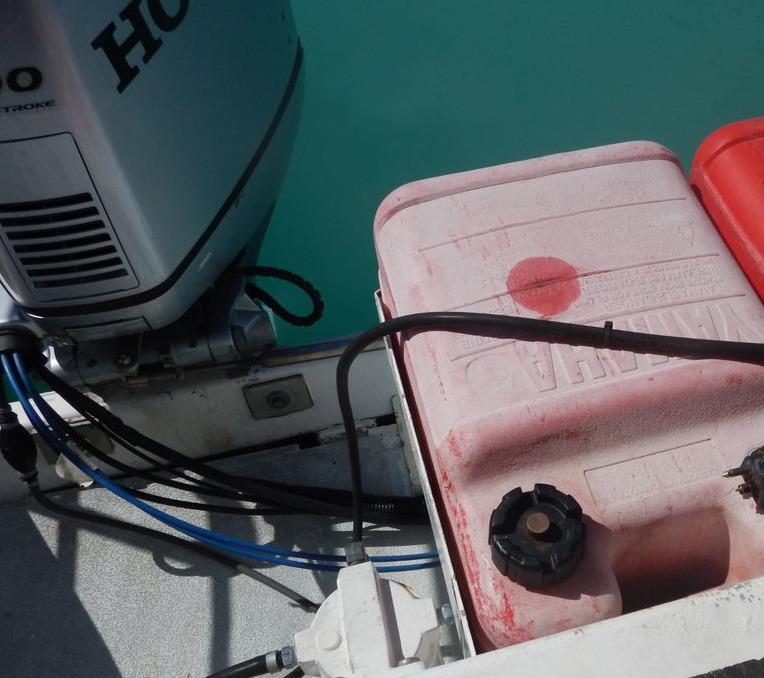
AMSA safety alert: Petrol vapours
by Australian Maritime Safety Authority 19 Sep 2019 17:24 NZST

Perished fuel tank with a leak © Australian Maritime Safety Authority
This safety alert highlights the risk of explosion due to accumulating petrol vapours.
Risk factors
Petrol vapours are denser than air so any petrol leaks or vapours can accumulate in a vessel's bilge, or in low parts of a cabin if the area is not properly ventilated. When petrol vapours mix with air within a specific concentration range, the mixture becomes explosive.
Exposure of accumulated petrol vapours to an ignition source may result in an explosion and fire with potentially catastrophic consequences. Potential ignition sources include:
- smoking, naked flames or pilot lights
- communication equipment eg mobile phones
- portable electrical equipment
- fixed electrical systems
- hot work eg welding, grinding and cutting
- hot surfaces eg exhaust pipes, flues, and ducting
- static electricity
- sparks generated by mechanical means eg hammers and other hand tools.
Vessels with non-compliant or poorly maintained fuel systems are at a greater risk of explosion or catching fire than those that are compliant and well maintained.
Preventing an explosion
The risk of an explosion can be reduced by:
- ensuring the vessel fuel system complies with the applicable technical standards and is periodically inspected by an accredited marine surveyor
- preventing the build-up of vapours by ventilating any area where accumulation of vapours could occur
- using gas detection equipment to check for a flammable atmosphere during refuelling
- removing, isolating or controlling all ignition sources
- removing residual fuels from the vessel and immediately cleaning up any spilt fuel
- ensuring electrics, including portable electrical equipment are maintained.
The vessel's safety management system (SMS) should cover the risks associated with explosion and fire, such as build-up of petrol vapour, and include the controls used to eliminate or minimise the risk.
Safe refuelling practices
Ten simple rules for refuelling.
- Try to ensure there are no passengers on board during refuelling and restarting after refuelling, and only essential crew are involved in the operation.
- Turn off the engine and isolate electrical equipment before refuelling.
- Do not use communication equipment other than intrinsically safe equipment including mobile phones and tablets during refuelling.
- Do not overfill the fuel tank and have a system to catch spills and clean up spills immediately, if they occur.
- Ventilate the area and compartments during and after refuelling properly installed and rated forced-ventilation will assist.
- Do not start the engine if you can detect vapours—gas detectors will assist.
- If possible, fill the fuel tanks in a well-ventilated area.
- Make sure the vessel is a non-smoking area during refuelling.
- Regularly check perishable fuel lines and connections for wear and tear and carry spares.
- Keep spare fuel in tightly capped and secure containers, in well-ventilated areas.
When developing or reviewing your procedures, please consider the below actions
- Ensure that your vessel's fuel systems have recently been inspected. If they haven't, or if you're unsure whether they have been inspected, contact an accredited marine surveyor.
- Contact your local state or territory work health and safety agency for requirements for managing the risks associated with ignition sources in hazardous atmospheres under work health and safety laws.
- Check for petrol vapours emanating from the fuel tank compartment or the presence of fuel within the fuel compartment. If you detect fuel vapours:
- Isolate the fuel source, close any fuel shut-offs or remove portable fuel tanks from the area.
- Isolate all potential ignition sources including by isolating batteries, turning off machinery and disconnecting from shore power.
- Remove people from the vicinity.
- Make contact with an accredited marine surveyor or other competent person for advice.
- Do not operate the vessel until the source of the vapours has been identified and corrective action has been taken.
Reminder
Petrol vapours are extremely volatile and are likely to explode when they come into contact with an ignition source.
For the safety of passengers and crew, it is essential the risk of explosion due to petrol vapours is managed through compliance with applicable technical standards, regular periodic inspections and safe operational practices.